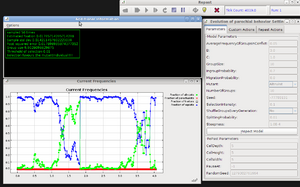Parochialism
From Evolution and Games
(→Run the software) |
(→Paramters) |
||
| Line 17: | Line 17: | ||
Use [http://www.java.com/en/download/index.jsp Java RunTime] 5.0 or newer to run the software. It should be just fine if you already have java installed in your machine, just double click once you have downloaded the file, or choose open from the browser box. | Use [http://www.java.com/en/download/index.jsp Java RunTime] 5.0 or newer to run the software. It should be just fine if you already have java installed in your machine, just double click once you have downloaded the file, or choose open from the browser box. | ||
| - | = | + | = Parameters = |
| + | |||
| + | {| border="1" cellpadding="2" | ||
| + | !width="225"|Parameter | ||
| + | !width="50"|Model | ||
| + | !width="225"|Simulation | ||
| + | |- | ||
| + | |Frequency of group conflict || <math>\kappa</math> || AverageFrequencyOfGroupsInConflict | ||
| + | |- | ||
| + | |Benefit (in the PD game) || <math>b</math> || B | ||
| + | |- | ||
| + | |Cost (in the PD game) || <math>c</math> || C | ||
| + | |- | ||
| + | |Group size || <math>n</math> || GroupSize | ||
| + | |- | ||
| + | |Probability of ingroup interaction || <math>\alpha</math> || IngroupProbability | ||
| + | |- | ||
| + | |Probability of migration || <math>\lambda</math> || MigrationProbability | ||
| + | |- | ||
| + | |Incumbent (or mutant) strategy || || Mutant | ||
| + | |- | ||
| + | |Number of groups || <math>m</math> || NumberOfGroups | ||
| + | |- | ||
| + | |Seed for random number generation || || Seed | ||
| + | |- | ||
| + | |Intensity of selection || <math>w</math> || SelectionIntensity | ||
| + | |- | ||
| + | |Re-shuffle groups every generation || || ShuffleGroupsEveryGeneration | ||
| + | |- | ||
| + | |Splitting probability || <math>q</math> || SplittingProbability | ||
| + | |- | ||
| + | |Steepness of winning probability curve || <math>z</math> || Steepness | ||
| + | |- | ||
| + | |||
| + | |} | ||
= Parameter ranges = | = Parameter ranges = | ||
Revision as of 18:19, 16 July 2010
Contents |
Abstract
The evolution of parochial altruism is not well understood. We study this problem by considering a prisoner’s dilemma game with four strategies: altruists who cooperate with everyone; parochialists who only cooperate with members of their own group; traitors who only cooperate with outgroup individuals; and egoists who never cooperate. We develop a model that allows for both assortment and conflict between groups. Individuals discriminate between in- and outgroup members. While assortment and conflict allow for the evolution of both indiscriminate and parochial altruism, discriminate behavior creates an advantage for parochialists over altruists, as the latter waste help on outgroup members. We use computer simulations to study the multilevel selection dynamics. The simulation model describes an ab- sorbing Markov chain. We examine the absorption probabilities of altruists and parochialists. Three model versions are compared, with only assortment, with only group conflict, and with both mechanisms. We find that parochialism is selected for by group conflict as well as assortment. Discrimination allows for cooperation inside groups to withstand regular interactions with outgroup members.
Run the software
You can download the software here.
Once the program is running just click on the big play button to start the fun. Feel free to re-arrange and re-size the windows, zoom-in and out as the program is running.
Use Java RunTime 5.0 or newer to run the software. It should be just fine if you already have java installed in your machine, just double click once you have downloaded the file, or choose open from the browser box.
Parameters
| Parameter | Model | Simulation |
|---|---|---|
| Frequency of group conflict | κ | AverageFrequencyOfGroupsInConflict |
| Benefit (in the PD game) | b | B |
| Cost (in the PD game) | c | C |
| Group size | n | GroupSize |
| Probability of ingroup interaction | α | IngroupProbability |
| Probability of migration | λ | MigrationProbability |
| Incumbent (or mutant) strategy | Mutant | |
| Number of groups | m | NumberOfGroups |
| Seed for random number generation | Seed | |
| Intensity of selection | w | SelectionIntensity |
| Re-shuffle groups every generation | ShuffleGroupsEveryGeneration | |
| Splitting probability | q | SplittingProbability |
| Steepness of winning probability curve | z | Steepness |

